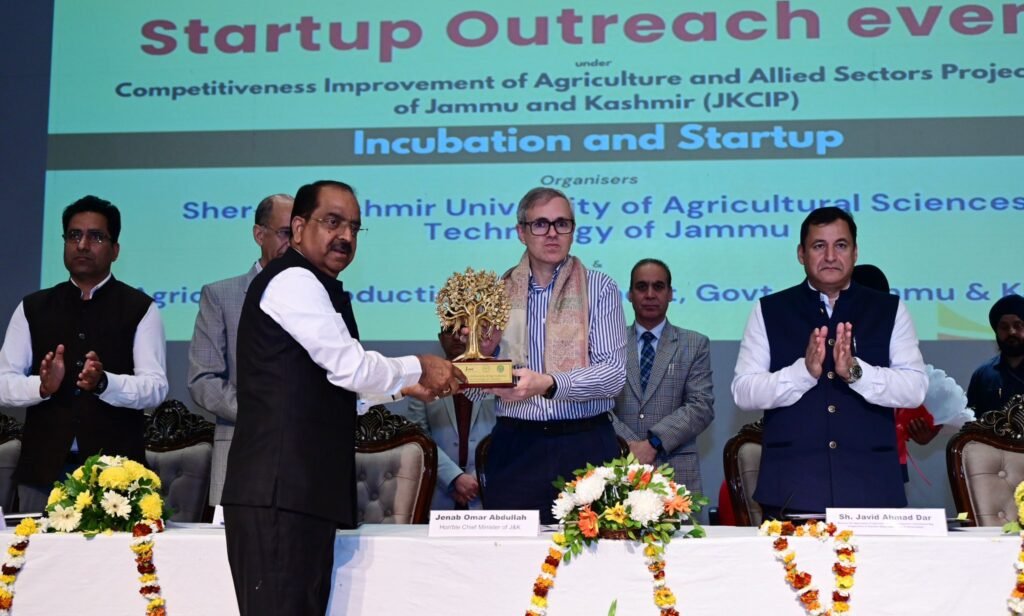Srinagar, October 27,2025:In a landmark move aimed at strengthening the horticulture sector, the Government of Jammu and Kashmir has announced that apple growers in the Union Territory will soon be covered under a comprehensive crop insurance scheme. The decision, hailed as a major relief for orchardists, seeks to protect them from financial losses caused by adverse weather conditions, pests, diseases, and natural calamities that often affect fruit production in the region.
A Major Step Toward Farmers’ Security
Jammu and Kashmir’s apple industry is one of the largest in India, contributing nearly 70% of the country’s total apple production. With over 3 lakh families dependent on the sector for their livelihood, the new insurance initiative is expected to act as a financial shield for growers who face recurring losses due to unpredictable weather patterns and frequent hailstorms.
Officials from the Department of Horticulture confirmed that the scheme will be implemented under the Weather-Based Crop Insurance Scheme (WBCIS). The objective is to provide timely financial support to farmers in the event of crop damage resulting from adverse climatic conditions such as frost, excessive rainfall, drought, and temperature fluctuations.
“This is not just a policy reform; it’s a lifeline for our orchardists,” said an official from the Horticulture Department. “The insurance cover will stabilise incomes and restore confidence among apple growers who have suffered immense losses over the years.”
Collaborative Model for Implementation
The government has initiated consultations with national-level insurance companies and financial institutions to finalize the operational framework of the crop insurance policy. The premium structure, claim process, and district-wise coverage areas are expected to be notified soon.
According to officials, the scheme will be implemented in collaboration with leading insurance agencies, ensuring transparency and efficiency in claim settlements. Farmers will contribute a nominal premium, while the central and UT governments will bear a significant portion of the cost.
The government is also considering the digitalisation of claim processes through mobile applications and satellite-based weather monitoring systems. This step aims to ensure that claims are processed swiftly and without bureaucratic delays — a concern that has plagued many insurance schemes in the past.
Horticulture — The Backbone of J&K’s Rural Economy
The horticulture sector forms the economic backbone of Jammu and Kashmir, contributing over ₹10,000 crore annually to the region’s GDP. Apples, walnuts, cherries, and saffron are among the top horticultural products exported from the Valley.
Apple farming alone occupies over 1.6 lakh hectares of land in Kashmir, producing around 2 million tonnes of apples annually. The sector not only sustains local livelihoods but also fuels allied industries such as packaging, cold storage, and transport.
However, despite its potential, the sector remains vulnerable to climatic changes. Erratic rainfall, early snowfall, and rising pest attacks have often led to sharp declines in production. The introduction of crop insurance is therefore seen as a critical intervention to safeguard farmers’ investments and promote resilience against climate change.
Government’s Broader Vision for Horticulture
The crop insurance scheme aligns with the government’s broader strategy to modernise the horticulture sector under the Holistic Agriculture Development Programme (HADP). The initiative emphasises the adoption of high-density plantation, improved post-harvest management, and market linkages to enhance productivity and profitability.
Hon’ble Lieutenant Governor Manoj Sinha has repeatedly emphasised the government’s commitment to empowering farmers through structural reforms. “The horticulture sector is the pride of Jammu and Kashmir,” the LG said in a recent public address. “We are ensuring that our fruit growers receive every possible support — from modern techniques to financial protection — so that their hard work translates into prosperity.”
Under the HADP framework, the UT administration is focusing on:
- Expanding cold storage capacity: The government aims to increase cold storage and controlled atmosphere (CA) facilities from 2.9 lakh MT to 6 lakh MT within the next few years.
- Promoting agri-tech: Introduction of drone-based pesticide spraying, automated weather stations, and digital soil health monitoring systems.
- Skill development for youth: Engaging rural youth through training in horticultural practices, entrepreneurship, and value addition.
- Export facilitation: Strengthening linkages with national and international markets to promote Kashmiri apples as a global brand.
Apple Growers Welcome the Decision
Local orchardists and trade associations have warmly welcomed the government’s announcement, calling it a “long-awaited safety measure.”
“Every year, we face uncertainty due to unpredictable weather,” said Mohammad Shafi, an apple grower from Shopian. “One hailstorm can destroy an entire season’s income. Crop insurance will at least ensure that we are not left helpless.”
Similarly, members of the Fruit Growers’ Association of Sopore, one of the largest apple trading hubs in North Kashmir, expressed optimism about the move. “If implemented effectively, this scheme will bring financial stability to thousands of growers,” said Ghulam Rasool, the association’s president. “We urge the government to ensure that claims are settled quickly and transparently.”
A Boost for Rural Economy
Experts believe that the crop insurance initiative will have a multiplier effect on the rural economy. By minimising financial risks, it will encourage farmers to invest more confidently in high-yielding and climate-resilient varieties. It will also attract private investment in allied sectors like logistics, cold chain infrastructure, and agri-tech innovation.
Moreover, the insurance cover could play a vital role in reducing rural indebtedness. Farmers often rely on informal credit sources to recover from crop losses, pushing them into debt cycles. A reliable insurance mechanism can prevent such financial distress.
Challenges and Implementation
While the announcement has generated optimism, experts caution that the success of the scheme will depend on execution. Transparent claim settlement, accurate weather data collection, and efficient grievance redressal will be key to ensuring farmer satisfaction.
Past experiences with crop insurance schemes in other states have shown that delayed payments and complex paperwork often discourage participation. The Jammu and Kashmir government, however, has assured that these challenges will be addressed through digital tools and proactive monitoring.
Officials are also planning to collaborate with Panchayati Raj Institutions and Krishi Vigyan Kendras (KVKs) to create awareness among farmers. Workshops and field-level demonstrations will help growers understand the benefits and procedures for availing of the insurance cover.
Integration with Other Reforms
The crop insurance initiative is being rolled out alongside other major reforms in the horticulture and agriculture sectors. These include:
- Subsidised fertilisers and farm inputs under various government schemes.
- Promotion of high-density apple plantations with 50% financial assistance to growers.
- Encouragement of Farmer Producer Organizations (FPOs) to improve collective bargaining and marketing.
- Strengthening e-Mandi platforms to enable direct farmer-to-buyer transactions.
Together, these reforms reflect the administration’s commitment to transforming Jammu and Kashmir’s rural economy into a modern, resilient, and self-reliant ecosystem.
The Road Ahead
As Jammu and Kashmir prepares to implement this insurance cover, it marks a new chapter in the region’s agrarian policy. The scheme represents not just financial protection but also hope and empowerment for the thousands of families who depend on apple farming.
Experts foresee a positive ripple effect: increased investment, reduced losses, enhanced productivity, and stronger trust between farmers and the government. If executed efficiently, the initiative could serve as a model for other hill states with similar climatic vulnerabilities.
Conclusion
The Government of Jammu and Kashmir’s decision to extend crop insurance coverage to apple growers is a transformative step toward ensuring economic security for farmers and revitalising the horticulture sector. Backed by technology, policy reforms, and administrative commitment, the initiative symbolises the region’s shift toward a more sustainable and resilient agricultural future.
As one grower aptly said, “When the government protects the apple, it protects the entire family.”











